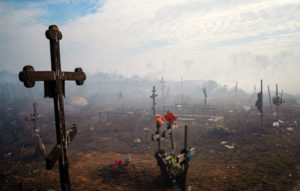“It’s much worse than everyone thinks.” Alan Riley is drinking tea on the outside patio of the Radisson hotel in central Chișinău, the capital of Moldova. “The recent winter energy crisis was exceptional. And we now realise that it was Russia softening up Europe for the war.”
If Riley, a nonresident senior fellow with the Atlantic Council Global Energy Center, is correct, Putin’s tactics have more than paid off. Gas and electricity prices could soon reach £3,000 in the UK, while household energy bills are predicted to reach €3,400 in Germany, €2,800 in France and just below €2,000 in Italy and Spain.
The story of EU reliance on Russian gas is one that is entirely avoidable and entirely frustrating as a result. Until 2013, only 25% of the natural gas that flowed into Europe came from Russia. But Europe — not for the first time — did the Kremlin a favour. Long-standing anti-nuclear feeling in Germany, galvanised by the 2011 Fukushima nuclear disaster, led Berlin to officially abandon nuclear power. Meanwhile, a series of earthquakes around the Groningen gas field — the largest in Europe, with its estimated 2,740 billion cubic metres of natural gas — meant that Dutch authorities decided to phase out production last year. It was the perfect storm of short-sightedness and bad governance, and it unchained revanchist desires in Moscow that eventually led the continent to the battlefields of Ukraine.
There is deep and pervasive anger in the country about all this. The people are grateful for all the help the West is giving them. But at the same time they are quick to quote EU foreign policy chief, Josep Borrell, who earlier this month observed that while Brussels has given Ukraine €1 billion in the form of foreign aid, since the war began it has paid €35 billion to Moscow for its energy. They cannot understand how Brussels is happy to simultaneously pay for both their own war effort and Russia’s.
In an office in central Odessa, I met with Panteleimon Bumburas, a local businessman and honorary Consul of Crimea and Kherson. “All of these problems started when the Russian Federation began earning more than €1 million a day due to the actions of Angela Merkel,” he told me. “She is not a leader but an accountant.” “Trust me,” an Odessite recently told me over tea. “You don’t want to rely on Russia for anything.”
But we do — and we have paid for it, and people still don’t understand exactly how. Riley explains: “What the Russians did in the spring [of 2021] was get ready for war. Normally what happens is that in spring you send gas cheaply into storage: this is how you build up supplies for winter. Well, back then I noticed two things: One, that this was not happening; and, two, they were not selling gas spot market. If you don’t do this, the price goes up and so does the price of long-term supply contracts. At this point, higher energy bills for ordinary people are inevitable.”
Riley thought this was an attempt by Moscow to force through the Nordstrom II gas pipeline that the United States, among others, was pressing Germany to, if not cancel, at least postpone. But he was wrong. “I now realise that it was an attempt to soften up the EU as part of a more general prelude to war in Ukraine — to make sure we would not come to the aid of Ukraine.” He could not be clearer: if their energy behaviour was anything to go by, Moscow knew it was going to invade Ukraine last spring; and it was happy to send millions across the European continent tumbling into energy poverty to make sure it got away with it. This, then, was an attack not just against Ukraine, but on all of us.
Riley identifies a further problem. “We also ran into wider difficulties,” he says. “The whole climate change agenda has turned off the voice of the energy industry, which does not always get a hearing. But the thing is: we do know about this stuff. Our warnings went unheeded — and energy prices began to surge.”
To some extent, the world was already facing rising energy prices last spring, largely because of increasing Chinese demand as industrial production returned to pre-Covid levels to satisfy pent-up consumer demand. But what we are seeing is not normal. Gas prices in Europe normally switch between $150-$500 per 1,000 cubic metres. Now it’s $1,000 per cubic metres. This, Riley tells me, is the Gazprom effect. “Half of the gas deficit of Europe can be directly attributed to [state-funded] Gazprom’s deliberate depletion of gas storages in the EU,” he says.
In the UK, of course, we are far less reliant on Russian gas. While the EU gets around 40% of its gas from Russia, the UK imports less than 5%. But it’s all linked to the same market, so a shortage of gas still makes its prices rise. Dependence is always a curse. To understand just how much, consider the United States, which has its own shale gas and is, as a result, now paying ten times less than Europe for energy.
All these problems will continue as long as we rely on Russian gas. But cutting ourselves off is also difficult. Riley believes an option might be to thoroughly tax what we pay Russia for its energy, and in so doing make it far harder for their war machine to operate. Moscow is acutely vulnerable here. If it wasn’t a petrostate before, after Western sanctions it is now pretty much a single-industry economy.
But even then, it might be too late. “The suffering of people in the UK and across Europe because of soaring energy bills is a direct result of Russia’s preparation for war,” Riley tells me as he finishes his tea. He pauses and then looks at me with a weary smile. “As it turned out, Gazprom was far more effective at executing war plans than the Russian army.”
Disclaimer
Some of the posts we share are controversial and we do not necessarily agree with them in the whole extend. Sometimes we agree with the content or part of it but we do not agree with the narration or language. Nevertheless we find them somehow interesting, valuable and/or informative or we share them, because we strongly believe in freedom of speech, free press and journalism. We strongly encourage you to have a critical approach to all the content, do your own research and analysis to build your own opinion.
We would be glad to have your feedback.
Source: UnHerd Read the original article here: https://unherd.com



